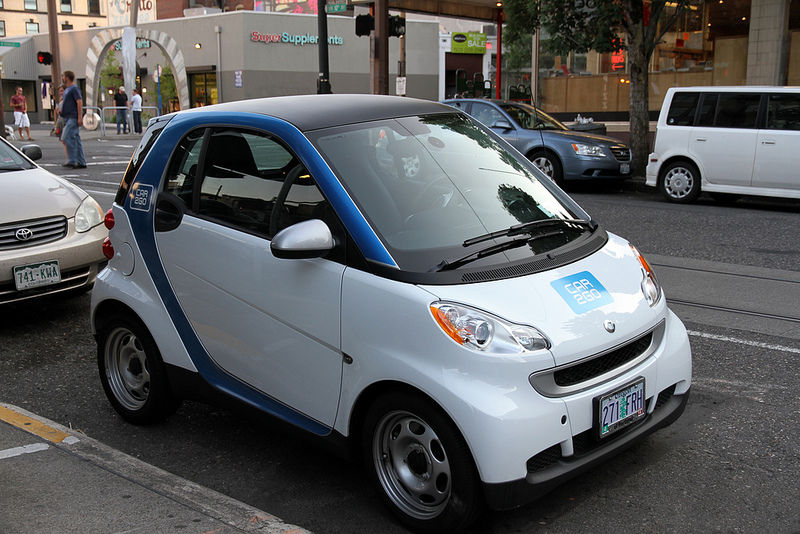
Given the importance of transportation and parking to urban development, a range of new and creative car sharing services now emerging could have a significant impact on development patterns—especially on infill—in the years and decades to come. Here’s the why and how.
The New Generation of Car Sharing
Car sharing allows users to rent a vehicle for short periods of time without the upfront costs of owning. Several car sharing companies now operate in the Portland metro area, including Zip Car, Getaround, and Car2Go.
Car2Go—perhaps the most innovative new service—began operating in Portland in late 2012, and it has already changed my transportation options and patterns. Simply put: Car2Go users can reserve a car at any time from their mobile phones or PCs; pick it up at curb parking locations throughout the city; drive where they want; and then park anywhere for free. (Yes, you read that last part right, Car2Go has a parking contract with the City of Portland and others where it operates.) The driving cost is generally about 38 cents per minute or a maximum of $14 per hour, and it is all enabled by mobile phone and in-car technology. Most trips of a few miles end up costing about $5.
So, why does this matter? It means people can walk to the grocery store and then drive back; stay late at work and drive home for a couple bucks, without having to wait for the infrequent, late-hour buses; or “borrow” a car during work hours to get quickly to and from a meeting.
Last weekend, I walked several miles with a friend to a local restaurant. After we each polished off a half-pound burger and beer, walking back in the light rain lost its appeal. So we jumped in a Car2Go vehicle parked a block away and drove back. It changed our perspective on how we could recreate and get around Portland’s neighborhoods.
Suddenly, errands and adventures don’t need to be done by either car or on foot, but possibly by a combination of both. And parking becomes much less of a hassle, since time limits and cost (and finding your car later) don’t apply. Services like this will get some couples and families thinking about whether they can move from two cars to one, or even from one car to none.
Development Impacts Parking is one of the key cost drivers of urban infill development projects. The less parking needed, the more easily projects “pencil.” According to recent analysis conducted by the City of Portland, a single structured parking space significantly increases the cost of a new apartment or condo unit, which can require the developer to increase rent by approximately 20 percent or more. Conversely, the City’s analysis indicates that, by “unbundling” parking and rent, and encouraging car sharing and transit, rental costs can be lowered with close-in neighborhoods. The less parking needed, the more developers will be able to build creative infill projects.
Policy We are already seeing some of the impacts of this thinking along Portland’s inner commercial corridors. Numerous mixed-use and housing projects are now under construction, with significantly reduced parking ratios—or no parking at all.
The policy decision to allow projects with no parking is now being very hotly debated amongst neighborhood advocates, city planners, and others. Without wading into the details, we can say that requiring an appropriate and lower amount of parking (rather than none) and giving people a new and versatile way to get around cities, holds a lot of promise to improve mobility and encourage development—both in Portland and in other western cities.
Leland Consulting Group can help you by evaluating the best ways to incorporate car sharing in new development, conducting site-specific market analysis, and weighing parking-related policy decisions.
Happy travels.

